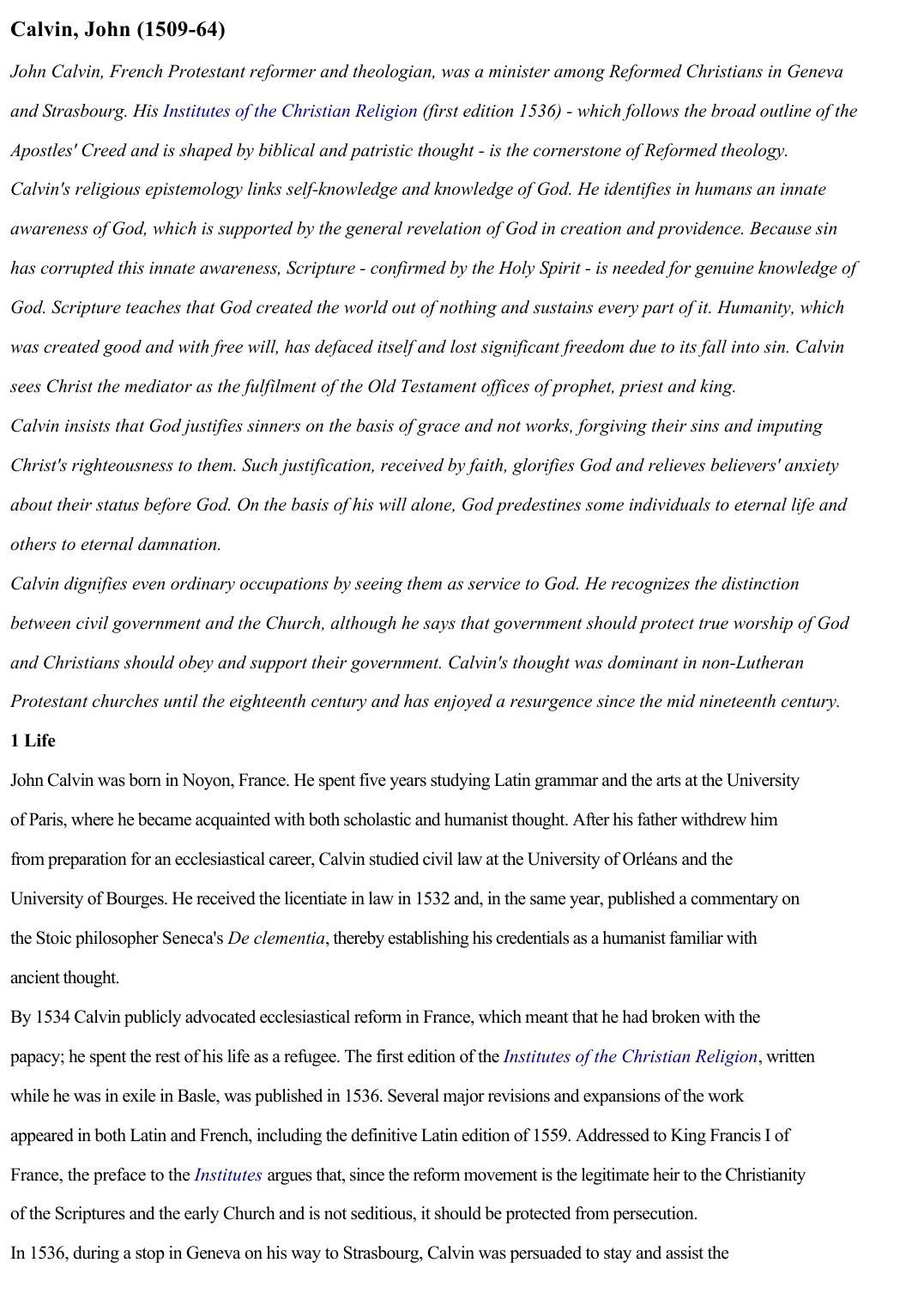Calvin, John
Publié le 16/05/2020

Extrait du document
«
Calvin, John (1509-64)
John Calvin, French Protestant reformer and theologian, was a minister among Reformed Christians in Geneva
and Strasbourg.
His Institutes of the Christian Religion (first edition 1536) - which follows the broad outline of the
Apostles' Creed and is shaped by biblical and patristic thought - is the cornerstone of Reformed theology.
Calvin's religious epistemology links self-knowledge and knowledge of God.
He identifies in humans an innate
awareness of God, which is supported by the general revelation of God in creation and providence.
Because sin
has corrupted this innate awareness, Scripture - confirmed by the Holy Spirit - is needed for genuine knowledge of
God.
Scripture teaches that God created the world out of nothing and sustains every part of it.
Humanity, which
was created good and with free will, has defaced itself and lost significant freedom due to its fall into sin.
Calvin
sees Christ the mediator as the fulfilment of the Old Testament offices of prophet, priest and king.
Calvin insists that God justifies sinners on the basis of grace and not works, forgiving their sins and imputing
Christ's righteousness to them.
Such justification, received by faith, glorifies God and relieves believers' anxiety
about their status before God.
On the basis of his will alone, God predestines some individuals to eternal life and
others to eternal damnation.
Calvin dignifies even ordinary occupations by seeing them as service to God.
He recognizes the distinction
between civil government and the Church, although he says that government should protect true worship of God
and Christians should obey and support their government.
Calvin's thought was dominant in non-Lutheran
Protestant churches until the eighteenth century and has enjoyed a resurgence since the mid nineteenth century.
1 Life
John Calvin was born in Noyon, France.
He spent five years studying Latin grammar and the arts at the University
of Paris, where he became acquainted with both scholastic and humanist thought.
After his father withdrew him
from preparation for an ecclesiastical career, Calvin studied civil law at the University of Orléans and the
University of Bourges.
He received the licentiate in law in 1532 and, in the same year, published a commentary on
the Stoic philosopher Seneca's De clementia , thereby establishing his credentials as a humanist familiar with
ancient thought.
By 1534 Calvin publicly advocated ecclesiastical reform in France, which meant that he had broken with the
papacy; he spent the rest of his life as a refugee.
The first edition of the Institutes of the Christian Religion , written
while he was in exile in Basle, was published in 1536.
Several major revisions and expansions of the work
appeared in both Latin and French, including the definitive Latin edition of 1559.
Addressed to King Francis I of
France, the preface to the Institutes argues that, since the reform movement is the legitimate heir to the Christianity
of the Scriptures and the early Church and is not seditious, it should be protected from persecution.
In 1536, during a stop in Geneva on his way to Strasbourg, Calvin was persuaded to stay and assist the.
»
↓↓↓ APERÇU DU DOCUMENT ↓↓↓
Liens utiles
- John Calvin Coolidge1872-1933En brisant la grève de la police de Boston en 1919, il s'était fait une réputation d'homme fort etacquis la reconnaissance nationale.
- John Calvin
- explication de texte: John Locke a écrit en 1690 un essai philosophique concernant l’entendement humain, nous allons analyser un extrait du livre II, chapitre 27, paragraphe 26
- John Steinbeck
- Saint-John Perse


